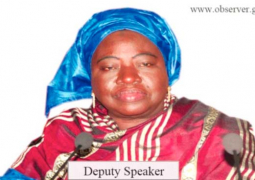
He said this has been demonstrated well in Kartong where Sandele Eco Retreat hosted the second Ecovillage Design Education course.
During the course, sustainable agriculture and environment experts gave lessons to local people on environmental protection and conservation thus encouraged climate smart agriculture in a bid to “grow what you eat and eat what you grow”.
Across the country, there are a host of similar success stories which are bringing The Gambia international recognition in the area of ecotourism and responsible tourism, Mr Bah said.
He pointed out that authorities need to look more closely at the social and environmental impacts of tourism, despite its tremendous performance in the economy.
He said:“As a developing country, we need to look inwards and endeavour that the policies in place are implemented accordingly in the best interest of national developments.
“This would encourage and attract foreign investors to invest heavily in the tourism sector in the country and it is also a necessary step in the process of establishing a vibrant tourism industry.Both the actions of investors and tourists play crucial roles in the socio-cultural values and protection of the country’s environmental assets.
“From an economic perspective, tourism provides wealth and job opportunities for young peoples.However, it could be argued that most of the wealth accumulated leak away from the community and that the jobs provided are mainly low rate income and so do not have a deep impact in development of the local populace.
“Most tourism related businesses in The Gambia are owned and managed by foreigners and as such, the local people or communities benefit very little from the profit made from the businesses tourists bring to the country, even though Gambians carry the burden of the impacts.
“Most of the tourists coming to the country are brought by foreign-owned tour operators such as Thomas Cook, and Gambia Experience who cover a very large area of the tourism market yet they employ few Gambians.
“One-third of the local people who are lucky to be employed in the tourism industry can usually only expect six months of work per year.And they are paid at very low rates which often cannot and do not sustain their families for the preceding six months until the next holiday season.
“From the socio-cultural perspective, tourism is known for bringing together people from different backgrounds, cultures and traditions thereby promoting peace.At the same time, due to globalisation effects in the sector of tourism, many communities have lost their cultural identity due to urbanisation and in addition tourism helped create parks and protected areas where unique examples of flora and fauna can be found.
“Perhaps the tourism industry needs to be carefully and strategically decentralised whereby every community can showcase their products and services directly to the visitors and gain maximum benefits.
“Considering the motivational factors, about 75 per cent of tourist’s attraction sites are located in the rural areas and yet rural people enjoy a tiny portion of the income gain from the tourists.
“Maximum support should be given to rural eco-lodges, who at times fail to meet industry standards, in order to help them upgrade and standardise their products and services to meet the needs of tourists.
“This will enhance sustainable development throughout the country because the income generated from tourist activities could be used to buy tools and other farming materials which will accelerate agricultural contributing towards achieving the Vision 2016 food self-sufficiency.
“In order to ensure smooth relationships between tourists and their host, a sensitisation campaign must be taken into consideration on how to manage the desires of tourists and to conserve the environment for sustainable development.”
To conclude, Mr Bah added that the tourism department should take steps to support to Ecotourism Society, The Gambia, a newly-found wing serving as watchdog in the advancement of ecotourism businesses.
He said the society also paves the way for tourism-related businesses in the rural areas such as eco-camps, local craft and waving, and eco-related projects.


